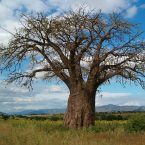
Baobab powder is obtained from the fruit of the baobab tree, which is native to Africa. The fruits are collected only once they fall off the tree, then they are cracked open to retrieve the dried pulp, which is very minimally hand-processed to become the baobab powder that we use. The dried pulp contains the seeds, which are separated from the dried pulp, and the pulp is then typically sieved twice to produce the powder. And ta da. A truly superfood powder with all its nutrients intact, thanks to the fact that there is no mechanical or heat processing to destroy any nutrients.
Baobab powder is known particularly for its high vitamin C content, but it actually contains many vitamins and minerals, and can even be called a multi-vitamin in its own right. Here’s what this amazing fruit contains:
vitamin C (6x that of oranges)
calcium (2x that of milk)
magnesium (2x that of leafy greens)
potassium (4x that of bananas)
iron
B vitamins
copper
Incidentally, iron absorption is enhanced by the presence of vitamin C. This is one of the major benefits of obtaining your vitamins and minerals from whole food sources, as opposed to taking supplements in the form of isolated vitamins as in the case of an overwhelming majority of supplements available for sale.
Baobab also has an astounding amount of fiber – baobab is about 50% fiber (mostly soluble but also some insoluble) which is good for bowel health as well as helping to manage blood glucose levels. The standard serving of baobab, which is 2 tablespoons, contains 1/3 of your recommended daily fiber requirements (about 10 grams).
Baobab powder is an excellent source of antioxidants…it has one of the highest antioxidant values of any fruit. Antioxidants neutralize free radicals in the body, and so may also help to prevent cancer, and they also have anti-aging properties.
As if that isn’t enough, baobab also contains high levels of polyphenols, which play a role in cancer prevention, as well as reducing the risk of heart disease.
Baobab also has a pectin content of about 50%, and pectin serves as a prebiotic, helping to promote the growth of good bacteria in the gut. A healthy level of good bacteria may also in turn help prevent allergies.
In a study done on rats, in which researchers tested hepatoprotective (liver protecting) properties, it was found that baobab showed a “significant protective effect against liver damage”.
With all that said, baobab appears to be quite a complete food, and as a result an excellent supplement to maintain health or improve upon a diet lacking in a good variety of nutrients. Baobab has a slightly tart-sour-fruity-citrus taste, not unpleasant. It’s easy to incorporate it into your diet…add it to smoothies, stir into yogurt, mix with fruit juice, but however you eat it, it shouldn’t be cooked because it will destroy the nutrients, so if you wish to add it to cooked food, add it after the cooking process.
references:
pandavita.com – how baobab powder is made
baobabsmile.com
healwithfood.org – reference to rat study









Leave a reply